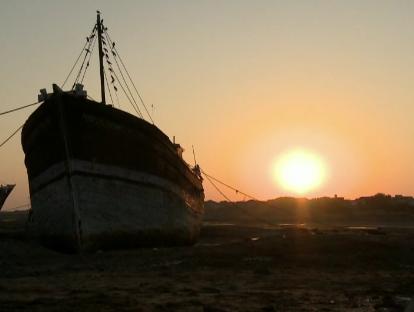
Piracy is an international problem that has some very far-reaching effects. Aside from the loss of human life and economic impact directly affecting the shipping industry, Indian ship builders are now hurting due to this criminal activity as well.
The port of Mandvi in India sits on the banks of the Rukmavati river, which flows into the Arabian Sea. Historically, this has been an important destination for trade and shipbuilding, but now neither is flourishing or even existent.
This is all thanks to a ban put in place in 2010 by the Indian government. All Indian-registered vessels are prohibited from traveling into pirate-infested waters near this location. At the time, Somali pirates had recently hijacked 8 boats and taken nearly 100 Indian crew members hostage.
Because these small vessels are so easy to hijack, they’re now banned from traveling anywhere south of Oman. This has the effect of preventing trade to many African states, especially Somalia, Kenya, Tanzania and on the Arabian Peninsula, Yemen.
This ban has been disastrous on both traders and ship builders, whose families have survived on these crafts for centuries. These small ships are an important part of the shipping community, because they are able to carry up to 1,000 tons of cargo, but aren’t as bulky as larger cargo vessels.
This allows them to reach countries with undeveloped ports that are incapable of taking in large shipping vessels. To a starving nation like Somalia, any shipments of rice and grain are highly sought after.
But because these smaller boats are easy targets for pirates, the trade must end. They are not as maneuverable as other vessels. They travel at slow speeds, and because of their construction, are not as capably of employing high-tech equipment.
The concern isn’t the cargo– that’s not what the pirates are after. They seek huge ransom payments for stealing the human capital. Indian sailors are among the most common nationality taken captive by pirates, and the government sees these situations as an immense and avoidable burden.
As the ban in Mandvi opens the door for others, reports are coming in that place like Dubai in the UAE are producing wooden dhows that are capable of carrying even more cargo than the ones formerly made in Mandvi. While many families from Mandvi have moved to Dubai to take part in the new industry there, the ones that have remained in India have been driven out of business.
Though many are out of business, the skills of the ship builders are still valued for the repair and maintenance of already existing ships, which still pass through Mandvi. But the glorious days of the ship building that has been going on for many centuries in Mandvi have come to a close, at least for now.